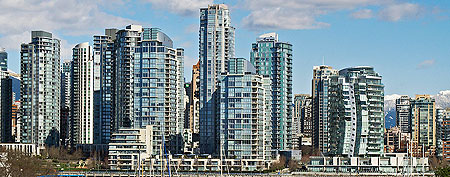 So you’re in the market for a condo. Do you buy one that hasn’t even been constructed yet or one that’s already standing? Two real-estate experts share their views on the pros and cons of presales and resales.
So you’re in the market for a condo. Do you buy one that hasn’t even been constructed yet or one that’s already standing? Two real-estate experts share their views on the pros and cons of presales and resales. MORE RELATED TO THIS STORY
—5 emotional home-buyers mistakes
—7 home-buying traps the wise will avoid
—Real estate trends in Canada in 2012
Potential increase in value.
“Depending on the scale of the development, you could have two, or in some cases, three years of potential appreciation,” says Tracie McTavish, president of Vancouver’s Rennie Marketing Systems. “Whatever you buy has a timeline of the construction period where the developer’s money is working for you; you’re gaining any appreciation that could occur.”
Better selection.
“You can select from a variety of suites; you can select the interior finish, choosing typically from two or three colours schemes,” says McTavish, a former developer. “It’s exciting.”
More time to save.
“Economically it’s a lot easier to deal with [than something already built] because, in typical fashion, it would be five percent down now, and perhaps five percent shortly thereafter. In markets like Vancouver where affordability is a challenge and the younger demographic is trying to get in the market, the presale plays into ability to save up or borrow money from parents or relatives to make the process function and in that two to three years to pay it all back.
When it comes time to complete you’ve got 20, 25 percent down and you’re off to the races. It allows you to take more baby steps financially.
“If you had to pick one challenge for first-time buyer it’s the down payment,” he adds. “Typically it’s the deposit that’s the barrier of entry for most people. If you purchase something tomorrow that’s finished, you’ve got to come up with money tomorrow. You’re typically closing within a fairly short period of time.”
Lower maintenance fees.
“It’s often the case that these will go up, but they shouldn’t go up for several years,” says Al Sutton, a realtor of 27 years with North Vancouver’s Prudential Sussex Realty. “With a presale you should have more or less a 10-year window where you shouldn’t be having too many outlays because of the sheer fact that everything’s new.”
Presale cons
The great unknown. “Some people aren’t comfortable not having that physical, tactile experience of seeing their suite, seeing their actual view; they just cannot comprehend the feel of what they’ll live in or what they’ll look at,” McTavish says.
“You can show them a plan and have everything to scale but some people just can’t get their head around that. It’s hard for a lot of people who are downsizing, say, from a three-bedroom bungalow to a 1,200-square-foot condo: is furniture going to fit?”
Sutton recommends asking for specific measurements. “Go back to where you live and try to make comparisons. Developers are very willing to give information; you just need to know to ask for it.”
He also advises doing research on the development company behind a presale: “Go online for feedback of that developer and its past history.”
Resale pros
Reality check.
“People know if they’re looking downtown they know exactly what their view is going to be,” McTavish says. “They can touch it, feel it; get a sense of the building, a sense of community, of the vibe in the building. They’ll know if their couch will fit. There are less unknowns.”
Sutton adds that a resale makes it easier to select a home that’s the right fit for your needs and lifestyle. “You can select a home that hopefully has the right environment, the right feel, the right outlook. On a resale you can walk through unit and know exactly what you’re getting.”
Proof of the building’s track record. “You’re buying into a proven product if in fact it is one,” Sutton says. That means more security for yourself and better chances of resale in the future.
Resale cons
It’s used. “Somebody’s lived there, so there’s probably wear and tear on the unit,” Sutton says, adding that a building inspection is absolutely critical. “It’s really up to buyer to be 100-percent satisfied with the collection of information on a resale.”
He advises getting two years’ worth of strata-council minutes plus any other pertinent documents that will divulge facts such as maintenance fees, any outstanding balance owed by that particular unit, and upcoming special assessments.
“It’s an opportunity to lift the hood and really dig around and look at how well that building has been run,” Sutton says. “On a used building it's really important to look under that hood. I recommend my buyer call the president of the council in the building. Get a perspective, if they’ll share it, of someone who’s lived in the building and who’s involved in management of the building.
“Look at the building from the back; go up the alley,” he adds. “Walk around the parkade. A suite itself might be very tempting but you need to check for any ongoing issues with the building.”


No comments:
Post a Comment